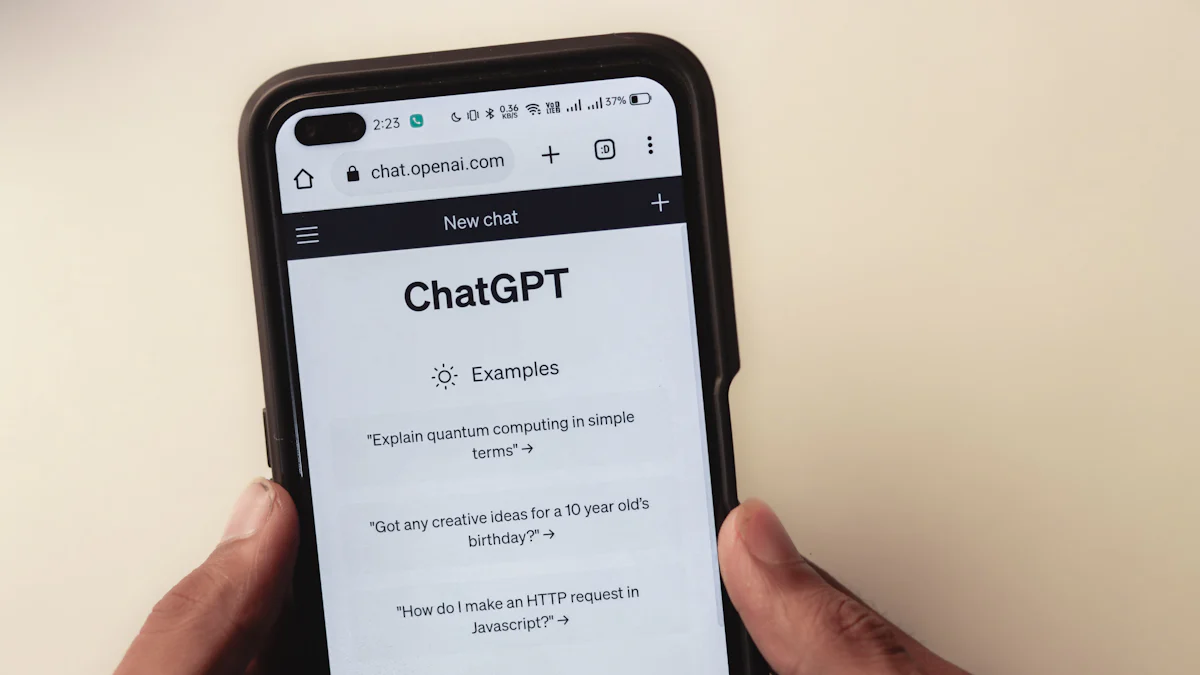Fixing Uncaught Typeerror When Serving Customers with Custom ChatGPT

Addressing Typeerror
In the realm of customer engagement, leveraging a custom ChatGPT can have a profound impact on interactions with customers. However, it is crucial to address the issue of uncaught typeerror that may arise when serving customers. This type of error can disrupt the seamless flow of communication and hinder the effectiveness of utilizing a custom ChatGPT for customer engagement.
By acknowledging and resolving uncaught typeerror challenges, businesses can ensure that their customer service initiatives are not compromised by technical issues. Recognizing and fixing these errors will ultimately contribute to a more efficient and satisfying customer experience.
Custom ChatGPT Functionality
Understanding Custom ChatGPT
Utilizing a custom ChatGPT offers a range of capabilities that can significantly enhance customer interactions. This tailored chatbot leverages advanced natural language processing to engage with customers in a personalized manner, providing relevant and contextually appropriate responses.
One of the key strengths of a custom ChatGPT lies in its ability to comprehend and respond to diverse customer queries, spanning from simple inquiries to more complex issues. By understanding the nuances of human language, it can effectively address customer concerns and provide tailored assistance.
In addition, a personalized ChatGPT can be trained on specific industry knowledge and company policies, ensuring that it aligns with the brand's voice and values. This level of customization enables businesses to deliver consistent and accurate information to customers, fostering trust and reliability in their interactions.
Moreover, the adaptability of a custom ChatGPT allows for seamless integration across various communication channels, including websites, messaging platforms, and mobile applications. This ensures that customers can access support wherever they are, enhancing convenience and accessibility.
Implementing Custom ChatGPT
Integrating a custom ChatGPT into customer engagement strategies involves deploying the chatbot across relevant touchpoints where customers seek assistance or information. This may include embedding it within webpages, integrating it into messaging apps, or incorporating it into customer service portals.
Furthermore, implementing a tailored ChatGPT involves training it on specific datasets related to the business domain and customer inquiries. By fine-tuning its responses based on historical interactions and frequently asked questions, businesses can ensure that the chatbot consistently delivers accurate and helpful information to customers.
In doing so, companies can elevate their customer engagement initiatives by providing instant support and guidance through the use of a customized chatbot. The seamless implementation of a personalized ChatGPT contributes to an enriched customer experience while streamlining operational processes for businesses.
By harnessing the functionality of a customized ChatGPT, businesses can revolutionize their approach to customer interactions by delivering tailored support and information seamlessly across various touchpoints.
Enhancing Customer Interactions
Personalized Customer Engagement
In the realm of customer involvement, personalized interactions play a pivotal role in fostering strong relationships and meeting the unique needs of clients. By integrating a custom ChatGPT into customer engagement strategies, businesses can deliver personalized experiences that resonate with individual customers.
A custom ChatGPT has the capability to understand and respond to specific customer inquiries, tailoring its responses to address the unique concerns of each client. This level of personalization creates a sense of attentiveness and care, enhancing the overall customer experience.
Moreover, personalized customer engagement through a custom ChatGPT allows businesses to provide relevant recommendations and solutions based on each client's preferences and history. This tailored approach demonstrates an understanding of the client's needs, ultimately strengthening their connection with the brand.
By leveraging a custom ChatGPT for personalized customer engagement, businesses can create meaningful interactions that are aligned with each client's distinct requirements, thereby fostering loyalty and trust.
Improving Customer Satisfaction
The use of a custom ChatGPT in customer engagement endeavors significantly contributes to improving overall customer satisfaction. By providing prompt and accurate responses to inquiries, businesses can ensure that customers receive the assistance they need in a timely manner.
Additionally, the personalized nature of interactions facilitated by a custom ChatGPT enhances customer satisfaction by addressing their specific concerns effectively. This leads to a greater sense of fulfillment and confidence in the support provided by the business.
Furthermore, as customers receive tailored guidance and information through a customized chatbot, they are more likely to perceive the brand as attentive and committed to meeting their needs. This positive perception directly influences their satisfaction levels and contributes to long-term loyalty.
Ultimately, by utilizing a custom ChatGPT to enhance personalized engagement and address customer inquiries effectively, businesses can elevate overall customer satisfaction while building enduring relationships with their clientele.
Recognizing Typeerror Issues
Identifying Typeerror Challenges
When it comes to integrating a custom ChatGPT into customer service operations, identifying the challenges posed by uncaught typeerror is crucial. Uncaught typeerror can manifest in various forms, such as unexpected data formats or incompatible responses, leading to disruptions in the chatbot's functionality. These challenges can impede the smooth flow of communication and hinder the chatbot's ability to provide accurate and timely assistance to customers.
By recognizing these typeerror challenges, businesses can proactively address potential issues and ensure that their custom ChatGPT operates seamlessly, delivering a consistent and reliable experience for customers.
Impact on Customer Experience
The implications of uncaught typeerror on the customer experience are significant. When customers encounter errors while interacting with a chatbot, it can lead to frustration and dissatisfaction. The inability of the chatbot to handle type errors effectively may result in incomplete or inaccurate responses, leaving customers feeling unsupported and dissatisfied with the service provided.
Moreover, uncaught typeerror can disrupt the natural flow of conversations, causing confusion and inconvenience for customers seeking assistance. This can ultimately tarnish the overall perception of the brand's customer service capabilities and impact customer loyalty.
Recognizing the impact of uncaught typeerror on customer experience underscores the importance of addressing these challenges effectively to maintain high levels of customer satisfaction and trust in the custom ChatGPT solution.
Fixing Typeerror Challenges
When encountering uncaught typeerror issues in custom ChatGPT implementations, it is essential to have effective strategies in place to address and resolve these errors. By proactively tackling typeerror challenges, businesses can ensure the seamless functionality of their custom ChatGPT solutions, thereby maintaining a high standard of customer service. Here are some practical approaches for fixing uncaught typeerror challenges and implementing solutions:
Resolving Uncaught Typeerror
Thorough Error Analysis: Conduct a comprehensive analysis of uncaught typeerrors to identify patterns and underlying causes. This may involve reviewing error logs, examining input data, and understanding the context in which the errors occur.
Code Debugging: Utilize debugging tools and techniques to trace the origin of uncaught typeerrors within the custom ChatGPT implementation. By isolating the specific segments of code that trigger these errors, developers can effectively address them.
Input Validation: Implement robust input validation mechanisms to ensure that the data received by the custom ChatGPT aligns with expected formats and types. This helps prevent unexpected typeerrors resulting from incompatible or malformed input.
Error Handling Mechanisms: Develop resilient error handling mechanisms within the custom ChatGPT framework to gracefully manage uncaught typeerrors. This involves defining appropriate error messages, fallback responses, and recovery strategies.
Implementing Solutions
Regular Testing and Quality Assurance: Establish a rigorous testing protocol to continuously validate the functionality of the custom ChatGPT across various scenarios. This includes simulated user interactions, edge cases, and stress testing to identify potential areas of vulnerability related to typeerrors.
Version Control and Rollback Procedures: Implement version control practices that allow for safe experimentation with error resolution strategies while maintaining the ability to revert to stable states if needed. This ensures that fixes for uncaught typeerrors do not introduce new issues.
Collaborative Problem-Solving: Foster collaboration among development teams, AI specialists, and domain experts to collectively address uncaught typeerror challenges. Drawing upon diverse expertise can lead to innovative solutions tailored to specific use cases.
By adopting these proactive measures for resolving uncaught typeerror issues and implementing robust solutions within custom ChatGPT implementations, businesses can fortify their customer engagement capabilities while mitigating technical disruptions effectively.
Optimizing Customer Interactions
Maximizing ChatGPT Performance
When aiming to optimize customer interactions, maximizing the performance of a custom ChatGPT is paramount. This involves enhancing the chatbot's ability to understand and respond to diverse customer inquiries while ensuring that the interactions are seamless and effective.
To achieve this, businesses can focus on continually refining the language processing capabilities of the custom ChatGPT. By fine-tuning its natural language understanding and response generation, companies can elevate the chatbot's performance in interpreting customer queries accurately and providing contextually relevant answers.
Moreover, optimizing the performance of a custom ChatGPT entails regular updates and maintenance to incorporate new industry insights, evolving customer preferences, and emerging conversational trends. This ensures that the chatbot remains aligned with current market dynamics and customer expectations, thereby maximizing its effectiveness in engaging clients.
Additionally, leveraging advanced analytics and feedback mechanisms enables businesses to gain valuable insights into how customers interact with the chatbot. By analyzing user interactions, businesses can identify patterns, preferences, and pain points, allowing for continuous improvement in the chatbot's performance.
By focusing on maximizing the performance of a custom ChatGPT, businesses can elevate their customer interactions by delivering more accurate responses, personalized experiences, and efficient support across various touchpoints.
Ensuring Seamless Customer Service
In optimizing customer interactions through a custom ChatGPT, it is essential to ensure seamless and effective customer service. This involves implementing strategies that prioritize smooth communication processes and proactive issue resolution while utilizing the chatbot as a pivotal component of customer engagement initiatives.
One key strategy for ensuring seamless customer service is integrating the custom ChatGPT with robust backend systems that facilitate quick access to relevant customer data. This integration streamlines information retrieval during conversations, enabling the chatbot to provide tailored assistance based on each client's history and preferences.
Furthermore, proactive maintenance of the custom ChatGPT framework is crucial for ensuring seamless customer service. Regular monitoring of system health and performance allows for timely identification and resolution of potential technical issues before they impact customer interactions.
Another vital aspect of ensuring seamless customer service is empowering human agents with tools to collaborate effectively with the custom ChatGPT. This collaborative approach ensures that complex inquiries or escalations are seamlessly transitioned between automated assistance from the chatbot to personalized support from human representatives when needed.
By implementing these strategies to ensure smooth communication processes and proactive issue resolution within a customized ChatGPT framework, businesses can optimize their overall approach to customer service while enhancing client satisfaction.
Overcoming Typeerror
When it comes to overcoming the challenges posed by uncaught typeerror and optimizing the functionality of a custom ChatGPT, businesses can take proactive measures to enhance customer interactions and elevate the overall customer experience. By addressing these technical hurdles effectively, organizations can ensure that their chatbot solutions operate seamlessly, providing valuable support and engagement for customers.
NewOaks AI is at the forefront of addressing typeerror challenges by developing chatbots with custom ChatGPT capabilities. Through innovative approaches and advanced technical expertise, NewOaks AI is dedicated to delivering robust solutions that mitigate uncaught typeerrors and enhance the performance of custom ChatGPT implementations.
See Also
Conversing with Your Data: A Complete Manual for Training ChatGPT using Personalized AI Chatbot
Transforming Appointment Booking with Personalized ChatGPT: Simple Walk-in Appointments
Improving Social Media Data Monitoring with Personalized ChatGPT and RTS Intercom Systems
Innovating Entertainment Chatbots with ChatGPT: The Ultimate Personalized Chat PNG Adventure
Boost Advertising Performance with Personalized ChatGPT Message Matching

